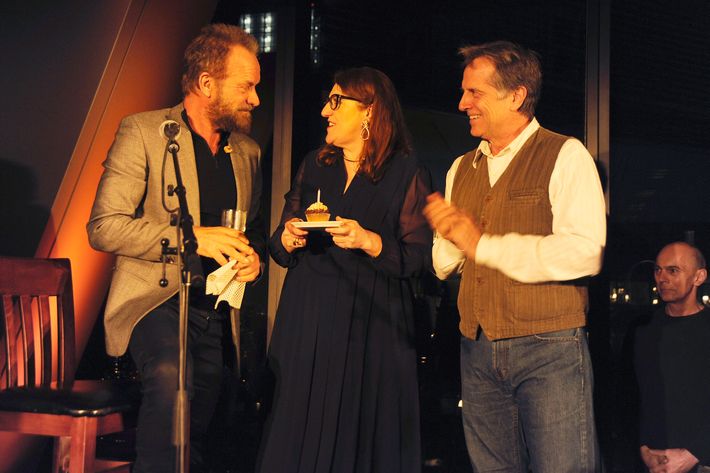
Last night, high atop the great black glass Hearst Tower, Sting played a short acoustic set of songs from The Last Ship, his grand industrial lament of a musical, which, despite its beautiful music, and, for a while, in an effort to get the show to sail right, his stepping onto the stage, too, had a rather disappointing run on Broadway last winter, closing in January.
But Broadway is “a very strange world,” Sting tells me, before he went up on the little stage, Central Park spread out behind him in the dark. “I mean, you either coincide with popular taste or you don’t, in any particular season,” and the fact that the musical didn’t turn out to be seaworthy “doesn’t really matter long term. I stand by the tone of the piece, its seriousness, its intent. It wasn’t a success on Broadway.” (Its producers lost their entire $15 million investment.)
But he doesn’t regret it. It is currently touring: “It’s about to go on in Norway,” he tells me, scratching his seaman’s beard, distractedly. “And we’re looking to have a production in London … I can’t say where.”
How will the U.K. version change? “It’s going to be a smaller production, a tighter production, economically. It will alter.” Will he again join the cast? “Perhaps. I enjoyed going into the show. Though I had no intention of doing it. I was forced to.”
I note that it’s such an English story — the decline of the shipyards. Why didn’t it start in London? “Because I was approached by people here,” he says. “The team was in New York. And I live here.”
The party itself was to celebrate the publication of a meticulously handcrafted book, The Last Ship: From the River of the Northern City, full of woodcuts by his friend, the artist Stephen Hannock. (They’ve known each other for thirty years, and Sting commissioned him to create a painting of Newcastle; the songs which became The Last Ship came out of a similar sense of Sting’s thinking about where he came from, after a period of writer’s block.)
Sting is a an accomplished art collector. “I own some of his paintings, of Stephen’s, from early on, when I could afford them still,” he jokes. “I actually own a lot of art. I’m selling some of it next year.”
“None of mine, I hope,” says Hannock.
“I’m just selling the Mickey Mouse Picassos and Matisses. Those arrivistes,” says Sting.
The book also contains lyrics inspired by Sting’s life in the shipbuilding city he grew up in, Newcastle, back in the days when ships still were built there, when the entire city, as he writes in the book’s introduction, “functioned as a giant interconnected construction machine,” and he, as young Gordon Sumner, wondered if he would “join this vast army of men and live out my days in the shadow of these giant ships?” Only 75 books are going to be created (on letterpresses in Massachusetts; even the paper is handmade), and they cost $7,000 each.
A hyperartisanal book that costs the same as a used car? The talented young Gordon had come a long way in the world from the days when he worried that he was going to be making ships (not that there are ships to be made anymore in Newcastle.) And that was the lesson of the night.
Before he played, Sting told the crowd, which included Hearst bigwigs like editorial director Ellen Levine and company president Michael Clinton, of how the street he grew up on led straight to the shipyard, where both his grandfather and father worked. “So I wondered with some trepidation if that was to be my fate,” he says. Once, he recalled, the Queen Mother was in town to help christen a ship. “I was 9 or 10 and my mother put me in my Sunday best, which I hated,” he says. As the big black Rolls Royce drove down his street, it paused just outside his house, “and she looked at me and waved that royal wave they do. I waved my little flag, and I feel I am having a relationship with [the Queen Mother],” he says, to appreciative laughter.
“I remind you that it wasn’t that long ago that it was felt that the royal family had magical powers, that if you could touch the king’s cloak you cure a horrible disease like scrofula …
And so here the Queen Mother is noticing me, and I’ve never been noticed by anyone. But I wasn’t cured of anything. I was infected with an idea: that I didn’t actually belong in this street, I didn’t belong in this house, and I didn’t want to end up in the shipyard. I wanted to be in that fucking car. I had grand dreams. I wanted to live in New York City. And here we are,” he tells the crowd.
The party also doubled as a celebration of Harper’s Bazaar editor Glenda Bailey’s birthday; at the end of the night, he sang her “Happy Birthday,” over a cupcake with a lit candle on it. Because it is magazine publishing in 2015, she made a joke about the cake being downsized.



